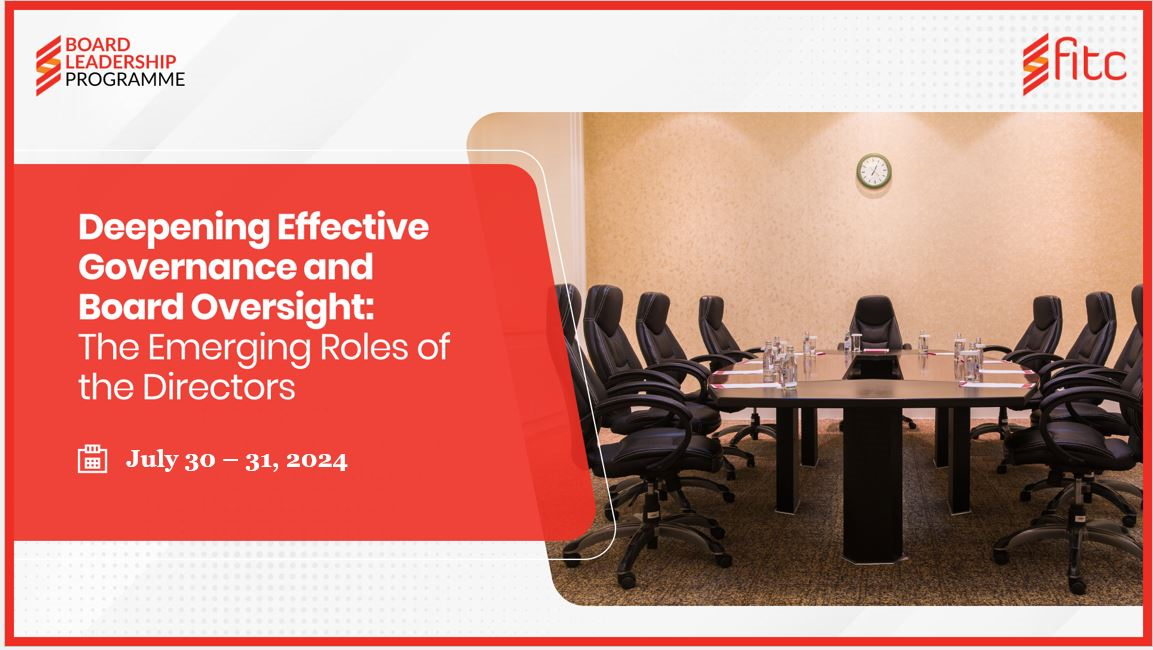Deepening Effective Governance and Board Oversight: The Emerging Roles of the Directors.

Backgrounds
An effective Board is at the heart of the governance structure of a well-functioning and well-governed corporation, acting as the ultimate internal monitor. Ideally, the Board guides long-term corporate strategy, puts the key agents in place to implement it, and monitors performance against the strategy set out. Consequently, bad company performance and governance begins with a Board not fulfilling its key responsibilities.
In today’s complex and volatile market dynamics, there is growing scrutiny on the role and performance of the Board, especially in the wake of governance issues across financial institutions. There are heightened expectations, given the volatile business environment and its associated risks, precipitated by technological advancements, disruptive digital and innovative solutions, and the interconnectivity of global activities. It is imperative, therefore for Boards to reposition their organizations through trust and confidence in the proper functioning of the Board, provide the right strategy direction, and governance systems to mitigate possible and ensure growth and sustainability.
This programme is therefore designed to provide an indepth analysis and insight into the emerging roles of the Board in developing the right governance structures, systems, best practices, as well as an effective Board oversight that promotes accountability, transparency and maximum stakeholder value.
Learning Outcomes
At the end of the programme, the following learning points must have been covered:
- Understand the evolving role and responsibilities of independent directors in modern corporate governance and to recognize the importance of their role in promoting effective governance practices.
- Gain more practical knowledge to effectively fulfill the duties of an independent director, including oversight of management, risk assessment, and promoting accountability and transparency.
- Identify and apply best practices for effective board oversight, including corporate strategy, risk management, and compliance.
- Analyse and evaluate emerging trends and challenges in corporate governance, including the increasing importance of ESG considerations and the role of technology in shaping corporate governance practices.
- Understand and navigate the legal and regulatory framework governing corporate governance, including fiduciary duties, disclosure requirements, and shareholder rights.
Learning Objectives
The learning objectives of the programme include:
- Understanding the evolving roles and responsibilities of the Board in achieving effective governance and Board oversight.
- Examine the requisite skills and knowledge imperative to perform their roles oto effectively fulfill the duties of an independent director, including oversight of management, risk assessment, and promoting accountability and transparency.
- Discuss best practices for effective board oversight, including corporate strategy, risk management, and compliance.
- Analyse emerging trends and challenges in corporate governance, including the increasing importance of ESG considerations and the role of technology in shaping corporate governance practices.
- Gain indepth understanding of the legal and regulatory framework governing corporate governance, including fiduciary duties, disclosure requirements, and shareholder rights.
Target Participants:
- Board Chairmen and Chairpersons, Executive and Non-Executive Directors, Independent Directors; Partners, Presidents, and top Multinational Leaders; Board Members in both finance and non-finance organisations, as well as public and private sectors organizations’ top leaders across diverse sectors and industries in Sub-Sahara Africa.
Programme Key Focused Areas
- Emerging Trends and Challenges in Corporate Governance (including ESG Considerations and the Role of Technology).
- Emerging Role and Responsibilities of the Board in Governance, Strategy Accountability and Transparency.
- Legal and Regulatory Framework Governing Corporate Governance, including Fiduciary Duties, Disclosure Requirements, and Shareholder Rights
- Best Practices for Board Composition, Structure, Processes, Importance of Diversity, Inclusivity, and Boardroom Culture.
- Board Effective Oversight in Risk Assessment, Executive Compensation and Succession Planning
- Case Studies of Successful and Unsuccessful Corporate Governance Practices and Key Lessons for the Directors.
Loading…



